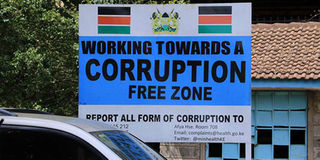Time we reformed procurement, payment systems to stem graft

A notice outside the Ministry of Health's headquarters in Nairobi warns against corruption. PHOTO | FILE | NATION MEDIA GROUP
What you need to know:
- Corruption starts with rigging up the public procurement system, regulated through the Public Procurement Oversight Authority.
- The creation of PPOA and implementation of Ifmis were supposed to strengthen the legal and regulatory machinery of public service delivery.
The war on corruption is painfully getting tougher. As grand corruption and abuse of office cases collapse in court, the hope of the prosecutors slaying the proverbial dragon gets dimmer.
The anti-corruption forces, led by Director of Public Prosecution Noordin Haji and the Director of Criminal Investigations George Kinoti, seem to be fighting a losing battle.
They can’t push convictions through a hostile legal maze. They are also overwhelmed by the pile-up of new files on corruption and mismanagement of public funds that need their attention.
The message from corruption cartels is simple and clear: They are fighting back viciously and biting deep into the forces that President Uhuru Kenyatta has marshalled to dismantle the graft networks embedded in the public procurement and payment system.
IFMIS
If Goldenberg, Anglo Leasing and other notorious corruption cases haven’t been solved for decades, it might be too much to expect that the gatekeepers of the judicial system have now seen the light and appreciate the urgency with which the cases before them should be resolved.
The biggest setback to the war against corruption lies in the due process that the criminal networks exploit to plunder public resources and protect their loot.
Corruption starts with rigging up the public procurement system, regulated through the Public Procurement Oversight Authority.
It is then processed through the public payments system by exploiting loopholes in the Integrated Financial Management Information System.
The creation of PPOA and implementation of Ifmis were supposed to strengthen the legal and regulatory machinery of public service delivery.
REFORMS
But since they have failed to control corruption in the public procurement and payment system, the government should re-assess its strategy and explore radical options of dealing with the vice that now poses one of the greatest risks to economic stability.
The critical step is to arrest the predatory behaviour at the tender and payment stages — to prevent corruption at conception.
This would be more effective than chasing after the horse when it has bolted.
It should be the entry point to extensive reforms to strengthen governance and accountability of the procurement and payment system.
Reforms should include new and innovative ways of fighting corruption.
CHECK POINT
Besides using the courts, the government should establish an independent public financial management agency to directly oversight PPOA and Ifmis transactions.
The agency would be empowered to review all procurement awards for major contracts, track their progress and review invoices before payments are processed.
Its task would be to enhance the integrity and accountability of the contract management chain in public service delivery.
It would act as a check point — to ensure, for instance, that contracts have been budgeted for, payments are made within budgets and no fictitious payments are made.
SUPPLIERS
A transformative contract management system should also expedite payments for government supplies to ease the chronic suffering of suppliers, who are struggling to survive in business while the government sits on their invoices for months or even years.
It would also save taxpayers the billions of shillings in interest and penalties on pending bills.
Its structure should be unique, with a board and staff singularly committed to integrity and accountability.
It shouldn’t just be another state agency staffed with representatives from professional associations disguised as diversity and inclusion.
Many boards and commissions with such representation have failed to deliver on their mandates.
DEDICATION
But we should be cautious not to create another monster like the National Land Commission that was created to resolve land allocation and compensation issues but integrated into the graft networks.
It would be a tragedy for the agencies dealing with graft to lose the fight and fail to account for the massive resources at their disposal.
They must kick extra hard to break out of the ring where the judge and the jury are mutual bedfellows.
Mr Warutere is a director of Mashariki Communications Ltd. [email protected]





